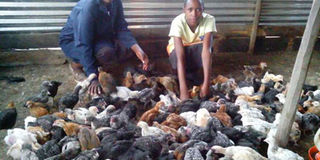Why I buy Kuroiler chicks from Uganda and not the local market

Lilian Kimutai in her poultry farm in Mulot, Narok South. PHOTO | STANLEY WAITAGEI | NATION MEDIA GROUP
What you need to know:
- Lilian Kimutai’s poultry farm is located here. Dressed in a blue dust-coat and a white headscarf, Lilian and her daughter Marion Chelangat walk in the chicken coop checking on how her 350 Kuroiler chickens are faring on.
- Lilian, who was a grocery trader before venturing into poultry, sources the Kuroiler chicks at Sh100 for a day-old from National Animal Resource Centre in Entebbe, Uganda, which is the main supplier of Kuroiler chicks in Eastern Africa.
- The move ensures she is guaranteed of quality birds as some of the Kuroilers sold in the market are fake. To get the chicks from Uganda, one places and pays a commitment fee, which is a percentage of the total cost of chicks.
About 11km from Mulot town in Narok South sub-county, off the Mulot-Ngaram Road is Ainabmoi village.
Lilian Kimutai’s poultry farm is located here. Dressed in a blue dust-coat and a white headscarf, Lilian and her daughter Marion Chelangat walk in the chicken coop checking on how her 350 Kuroiler chickens are faring on.
She started the intensive poultry venture last September, spending Sh90,000, which she had saved after selling her crossbreed hens she kept under the free-range system.
Part of the money also went to the expansion of the chicken house, which can now accommodate 500 birds
“Proper housing is important and it is the foremost consideration before one ventures into poultry keeping. The house should be well-ventilated to avoid build-up of ammonia from chicken droppings,” says Lilian, 39 and a mother of three, who turned to the intensive system because it is easy to monitor production of the chickens and carry out the control of diseases and parasites.
She cleans and disinfects the chicken house on a regular basis by sprinkling ash on the floor.
This, she says, helps to prevent a number of diseases like Newcastle and gumboro.
Anyone entering the chicken house must disinfect their feet, a bio-security measure she has put to control diseases.
She grinds garlic and aloe vera leaves, mixes with clean water and puts in the drinkers to keep diseases at bay and help boost the birds’ immunity.
Besides the 350 Kuroilers, she keeps a further 200 birds, a mixture of Kenbro, Dorep and pure Kienyeji breeds reared under the free-range system in a project she started in 2014.
Lilian, who was a grocery trader before venturing into poultry, sources the Kuroiler chicks at Sh100 for a day-old from National Animal Resource Centre in Entebbe, Uganda, which is the main supplier of Kuroiler chicks in Eastern Africa.
The move ensures she is guaranteed of quality birds as some of the Kuroilers sold in the market are fake. To get the chicks from Uganda, one places and pays a commitment fee, which is a percentage of the total cost of chicks.
“The balance must be cleared before the collection date or on the collection date. One will then be informed or notified in advance when the chicks are due for collection. One can go and pick or use the courier service.”
Similarly, she bought the Kenbro and Dorep breeds in Kiambu through a friend and the pure Kienyeji from the local market.
She uses the Kienyeji birds to hatch eggs laid by the Dorep and Kenbro breeds as they cannot brood.
When the Kienyeji chicken shows sign of brooding, she places eggs that are not more than 10 days old in the nest made of timber and lined with saw dust to provide warmth. She regularly disinfects the box to keep parasites such as mites at bay. The number of eggs she gives her chicken to hatch depends on the body size of the bird.
She hatches 100 to 150 eggs a month and she sells an average of 10 crates of eggs in a good day. Before bringing in new chicks, she disinfects the chicken house and ensures the brooder is safe from predators, direct wind and is well ventilated.
WARMING BROODER
She uses charcoal to warm the brooder soon after hatching. Lilian adds glucose in the chicks’ drinking water to offer the them energy and reduce stress.
Sophie Miyumo, an expert at Department of Animal Science, Egerton University, says mortality during the first two weeks of a chick’s life is often related to the quality of hatched chicks.
“Chicken must be active, clean and dry with open, bright and alert eyes. One must ensure that the brooder is pre-heated before stocking the chicks and to avoid stress, provide them with clean warm water mixed with glucose and chick formula, which contains vitamins and anti-biotics.”
Currently, the farmer has not started reaping from the Kuroilers. However, fertilised eggs from her Kenbro and Dorep breeds are going for Sh20 each.




